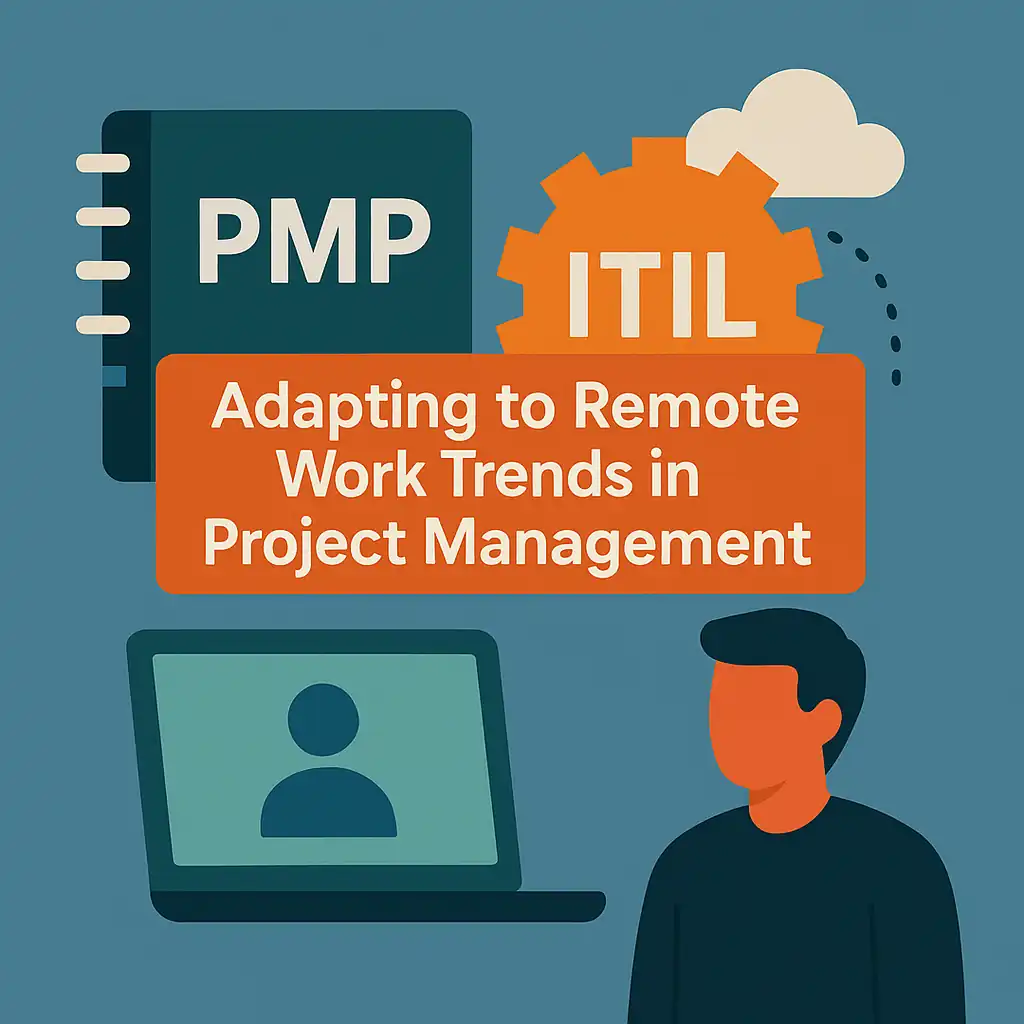Introduction
The shift towards remote work has become a defining trend. As organizations adapt to this new normal, frameworks like Project Management Professional (PMP) and Information Technology Infrastructure Library (ITIL) have gained prominence for their structured approaches to managing projects and IT services, respectively.
PMP Overview: The PMP certification, governed by the Project Management Institute (PMI), is a globally recognized standard that validates a project manager’s skills in leading and directing projects across various industries. It encompasses a comprehensive understanding of project management principles, methodologies, and best practices, making it essential for managing complex projects effectively [3][8].
ITIL Overview: On the other hand, ITIL focuses primarily on IT service management, ensuring that IT services align with business needs and are delivered efficiently. It provides a framework for managing IT services throughout their lifecycle, which is crucial for organizations that rely heavily on technology [5][4].
As remote work becomes increasingly prevalent, adapting these frameworks to suit virtual environments is vital. The importance of flexibility and effective communication in remote project management cannot be overstated. Project managers must leverage the structured methodologies of PMP while integrating the service-oriented principles of ITIL to ensure that remote teams remain productive and aligned with organizational goals.
This blog post will explore how both PMP and ITIL can be adapted for remote project teams, highlighting their intersection and the benefits they offer in navigating the challenges of remote work. By understanding how to effectively implement these frameworks in a virtual setting, project managers can enhance collaboration, streamline processes, and ultimately drive project success in a remote work environment.
Understanding PMP and ITIL
With the rise of remote work, understanding the frameworks that guide project execution is crucial. Two prominent frameworks in this domain are the Project Management Professional (PMP) and the Information Technology Infrastructure Library (ITIL). Each serves distinct purposes and offers unique methodologies that can be adapted to the needs of remote project teams.
Definition and Purpose of PMP
PMP, governed by the Project Management Institute (PMI), is a comprehensive methodology designed to manage projects effectively across various industries. It emphasizes the importance of structured project management practices, focusing on:
- Project Planning: Establishing clear objectives, timelines, and resource allocation.
- Execution: Implementing project plans while managing teams and stakeholders.
- Monitoring and Controlling: Tracking progress and making necessary adjustments to ensure project success.
PMP is particularly beneficial for remote project managers as it provides a clear framework for managing tasks and responsibilities, ensuring that all team members are aligned and accountable, regardless of their physical location [1][14].
Definition and Purpose of ITIL
ITIL, on the other hand, is a framework specifically tailored for IT service management. It provides best practices for delivering high-quality IT services and focuses on aligning IT services with the needs of the business. Key aspects of ITIL include:
- Service Strategy: Defining the services that will be offered and how they will meet business needs.
- Service Design: Planning and designing IT services to ensure they are effective and efficient.
- Service Transition and Operation: Managing the transition of services into operation and ensuring they are delivered effectively.
For remote teams, ITIL can help streamline IT service delivery, ensuring that team members have the necessary tools and support to perform their roles effectively, even from a distance [9][11].
Key Differences Between PMP and ITIL
While both PMP and ITIL are valuable in their own right, they differ significantly in focus and application:
- Focus: PMP is centered on project management, providing a structured approach to managing projects from initiation to closure. In contrast, ITIL focuses on IT service management, emphasizing the delivery and management of IT services rather than project execution [10][13].
- Application: PMP methodologies can be applied across various industries and project types, making it versatile for different project managers. ITIL, however, is specifically designed for the IT sector, although its principles can be adapted to other areas of service management [12][14].
Challenges of Remote Project Management
As remote work becomes increasingly prevalent, project managers face a unique set of challenges that can impact the effectiveness of their teams and the success of their projects. Both the Project Management Professional (PMP) framework and the Information Technology Infrastructure Library (ITIL) can be adapted to address these challenges, but understanding the specific hurdles is crucial for remote project teams. Here are some key challenges that remote project managers encounter:
- Communication Barriers Due to Distance: One of the most significant challenges in remote project management is the lack of face-to-face interaction. This can lead to misunderstandings, misinterpretations, and a general sense of disconnect among team members. Effective communication is essential for project success, and remote teams must leverage various tools and strategies to ensure clarity and maintain engagement [2][6].
- Difficulty in Team Collaboration and Engagement: Remote work can hinder collaboration, as team members may struggle to work together effectively without the benefit of in-person meetings. This can result in decreased morale and engagement, making it essential for project managers to foster a collaborative culture through regular check-ins, virtual team-building activities, and the use of collaborative tools [3][4].
- Maintaining Project Timelines and Deliverables: Keeping projects on track can be more challenging in a remote environment. Project managers must be vigilant in monitoring progress and ensuring that team members are meeting deadlines. This requires a robust task management system and clear expectations regarding deliverables, as well as the ability to adapt to unforeseen delays that may arise due to remote work dynamics [1][8].
- Managing Stakeholder Expectations Remotely: Engaging with stakeholders can be more complex when working remotely. Project managers need to establish effective communication channels to keep stakeholders informed and involved in the project. This includes regular updates, virtual meetings, and transparent reporting to manage expectations and address any concerns that may arise during the project lifecycle [2][5].
By recognizing and addressing these challenges, remote project managers can better adapt the PMP and ITIL frameworks to enhance their team’s performance and ensure successful project outcomes in a remote work environment.
Adapting PMP for Remote Teams
As remote work becomes increasingly prevalent, project managers must adapt their methodologies to ensure effective collaboration and project success. The Project Management Professional (PMP) framework offers a robust structure that can be tailored to meet the unique challenges of remote teams. Here are key strategies for adapting PMP to enhance remote project management:
- Applying Agile Methodologies within the PMP Framework: Agile methodologies emphasize flexibility and responsiveness, making them ideal for remote teams that may face changing circumstances. By integrating Agile principles into the PMP framework, project managers can foster a culture of continuous improvement and adaptability. This approach allows teams to respond quickly to feedback and evolving project requirements, which is crucial in a remote setting where communication may be less frequent and more asynchronous [10].
- Utilizing Digital Tools for Project Planning and Tracking: The use of digital tools is essential for remote project management. Tools such as project management software (e.g., Trello, Asana, or Microsoft Project) enable teams to plan, track progress, and manage resources effectively from different locations. These platforms provide a centralized space for documentation, task assignments, and timelines, ensuring that all team members have access to the same information and can collaborate seamlessly [8][11].
- Establishing Effective Virtual Communication Channels: Clear communication is vital for remote teams to function effectively. Project managers should establish multiple communication channels, such as video conferencing, instant messaging, and collaborative platforms, to facilitate real-time discussions and updates. Regular check-ins and virtual meetings can help maintain team cohesion and ensure that everyone is aligned with project goals and timelines [9][10].
- Creating a Remote-Friendly Project Governance Structure: A well-defined governance structure is crucial for remote project teams. This includes establishing roles and responsibilities, decision-making processes, and performance metrics that are clear and accessible to all team members. By creating a governance framework that accommodates remote work, project managers can ensure accountability and transparency, which are essential for maintaining trust and collaboration among team members [12][14].
By adapting the PMP framework to incorporate these strategies, project managers can effectively lead remote teams, ensuring that projects are delivered on time and within scope, despite the challenges posed by physical separation. This tailored approach not only enhances productivity but also fosters a collaborative environment that is essential for remote work success.
Adapting ITIL for Remote Work
As organizations increasingly embrace remote work, adapting frameworks like ITIL (Information Technology Infrastructure Library) becomes essential for maintaining effective service management. Here are key points on how ITIL can be adjusted for remote team operations:
- Leveraging ITIL’s Service Lifecycle in a Remote Context: The ITIL service lifecycle can be effectively utilized in a remote environment by ensuring that all phases—from service strategy to service operation—are aligned with the unique challenges of remote work. This involves revisiting service strategies to align IT services with evolving business goals, which is crucial in a dispersed workforce where traditional methods may not apply [11].
- Implementing ITIL Practices for Remote Incident and Problem Management: Remote teams can adopt ITIL practices for incident and problem management by utilizing digital tools that facilitate communication and collaboration. This includes establishing clear protocols for reporting incidents and managing problems remotely, ensuring that team members can respond swiftly and effectively, regardless of their location [10].
- Adapting Change Management Processes for Virtual Environments: Change management processes must be tailored to accommodate the dynamics of remote work. This involves creating a framework that allows for flexible approvals and communications, ensuring that changes can be implemented smoothly without the need for in-person meetings. Emphasizing transparency and documentation in virtual environments can help maintain control over changes while fostering team engagement [11].
- Enhancing Service Delivery Through Remote Platforms: To improve service delivery, organizations should leverage remote platforms that support ITIL practices. This includes using project management tools that facilitate real-time collaboration, video conferencing, and file sharing. By integrating these tools into the ITIL framework, remote teams can enhance their service delivery capabilities, ensuring that they meet the needs of their clients and stakeholders effectively [13].
By adapting ITIL to the realities of remote work, project managers can ensure that their teams remain agile, responsive, and aligned with organizational goals, ultimately driving project success in a virtual landscape.
Integrating PMP and ITIL for Remote Project Success
With the rise of remote work, integrating the Project Management Professional (PMP) framework with the Information Technology Infrastructure Library (ITIL) can significantly enhance the effectiveness of project teams. This section explores how remote project managers can leverage both frameworks to create a comprehensive strategy that improves efficiency and service delivery.
Creating a Comprehensive Project Management Strategy
Combining PMP and ITIL allows project managers to develop a holistic approach to managing projects. PMP provides a structured methodology for initiating, executing, and closing projects, which is essential for maintaining clarity and direction in remote settings. ITIL complements this by offering a framework focused on the governance of IT services, emphasizing continual measurement and improvement of service quality. By integrating these frameworks, remote teams can ensure that their project management strategies are not only robust but also adaptable to the unique challenges posed by remote work environments. This integration fosters a culture of accountability and continuous improvement, which is vital for remote teams that may struggle with communication and collaboration [1][2].
Benefits of a Unified Approach
The merger of PMP and ITIL brings several benefits that are particularly advantageous for remote project teams:
- Improved Efficiency: By utilizing PMP’s structured project management processes alongside ITIL’s service management practices, teams can streamline workflows and reduce redundancies. This leads to increased productivity and fewer disruptions, which are critical in a remote work context where team members may be in different time zones [5][8].
- Enhanced Service Delivery: ITIL’s focus on service quality ensures that project outcomes align with customer expectations. When combined with PMP’s emphasis on project success criteria, remote teams can deliver higher quality results, leading to improved client satisfaction and trust [2][5].
- Adaptability: The integration of these frameworks allows teams to be more agile in their project management approach. As remote work often requires quick pivots and adjustments, having a unified strategy enables teams to respond effectively to changing circumstances and project requirements [8][9].
Real-World Examples of Successful Integration
Several organizations have successfully integrated PMP and ITIL to enhance their remote project management capabilities:
- Case Study 1: A global IT services company adopted a hybrid approach by training its project managers in both PMP and ITIL methodologies. This enabled them to standardize their project management processes while ensuring that service delivery met ITIL’s quality benchmarks. As a result, the company reported a 30% increase in project success rates and improved client feedback on service quality.
- Case Study 2: A remote software development team implemented a combined PMP and ITIL framework to manage their projects. By utilizing PMP for project planning and execution, and ITIL for service management, they were able to enhance communication among team members and stakeholders. This led to a significant reduction in project delays and an increase in overall team morale, as team members felt more connected and engaged in their work [3][4][6].
Best Practices for Remote Project Managers
Especially in remote settings, both the Project Management Professional (PMP) framework and the Information Technology Infrastructure Library (ITIL) can be effectively adapted to enhance team performance and project outcomes. Here are some actionable best practices for remote project managers that leverage the strengths of both frameworks:
- Fostering a Culture of Communication and Transparency: Establishing open lines of communication is crucial in remote teams. Project managers should encourage regular check-ins and updates, utilizing tools like video conferencing and instant messaging to maintain transparency. This aligns with ITIL’s emphasis on clear communication channels to ensure that all team members are informed about project status and changes, thereby reducing misunderstandings and enhancing collaboration [1].
- Encouraging Team Collaboration Through Digital Tools: Utilizing digital collaboration tools is essential for remote teams. Platforms such as Trello, Asana, or Microsoft Teams can facilitate task management and foster teamwork. By integrating Agile principles from PMP, such as iterative development and frequent feedback, project managers can create an environment where team members feel engaged and connected, even when working from different locations [2][4].
- Regularly Reviewing and Adapting Project Plans: The shift to remote work often brings unforeseen challenges that require flexibility. Project managers should regularly review project plans and adapt them based on team feedback and changing circumstances. This practice not only aligns with Agile methodologies but also resonates with ITIL’s focus on continuous improvement and service delivery, ensuring that the project remains on track despite the dynamic nature of remote work [4][5].
- Providing Training and Resources for Team Members on Both PMP and ITIL: To maximize the effectiveness of both frameworks, project managers should invest in training and resources for their teams. This could include workshops on PMP methodologies and ITIL processes, as well as access to online courses and materials. By equipping team members with the necessary knowledge and skills, project managers can enhance their team’s ability to navigate the complexities of remote project management [3][9].
By implementing these best practices, remote project managers can create a more cohesive and productive team environment, effectively leveraging the strengths of both PMP and ITIL frameworks to adapt to the challenges of remote work.
Conclusion
In the context of remote work, adapting established frameworks like PMP (Project Management Professional) and ITIL (Information Technology Infrastructure Library) is crucial for success. As organizations increasingly embrace remote collaboration, the ability to effectively manage projects and IT services from a distance has become paramount.
Key Takeaways:
- Importance of Adaptation: The integration of remote work necessitates a reevaluation of traditional project management methodologies. Both PMP and ITIL provide structured approaches that can be tailored to meet the unique challenges posed by remote teams. By leveraging these frameworks, project managers can ensure that their teams remain aligned, productive, and engaged, regardless of their physical locations [1][2].
- Implementation of Best Practices: To thrive in a remote environment, project managers should implement best practices that enhance communication, establish clear expectations, and foster collaboration among team members. This includes utilizing digital tools for project tracking, regular check-ins, and creating a culture of accountability and support [3][4].
In conclusion, the adaptation of PMP and ITIL for remote project teams is not just beneficial; it is essential. By embracing these frameworks and implementing the discussed best practices, project managers can navigate the complexities of remote work effectively, ensuring that their projects are delivered on time and within scope. Now is the time to take action—evaluate your current practices and make the necessary changes to thrive in this new era of project management.
Find out more about Shaun Stoltz https://www.shaunstoltz.com/about/.
This post was written by an AI and reviewed/edited by a human.



